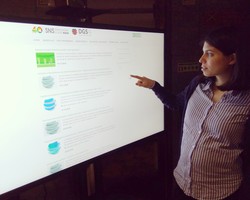Portuguese Health Literacy Action Plan helps people to help themselves

Miguel Telo de Arriaga
In a bid to improve the ability of individuals to access, understand and use correct information to maintain good health, Portugal has initiated a Health Literacy Action Plan, which encourages the active participation of its citizens in health-care decisions.
The Action Plan focuses on people-centred interventions, increasing health literacy levels among the Portuguese population in a sustainable way, enhancing the ability of people to navigate the Portuguese National Health Service within the context of their everyday lives and improving self-care and disease management.
“This is our way to tackle health literacy over an individual’s entire life-course,” said Miguel Telo de Arriaga, Head of the Division of Literacy, Health and Well-being, Directorate-General of Health (DGS), Portugal. “It focuses on children, the elderly and people in the working age population, who are in the prime of their lives, to lower levels of mortality and prevent disease.”
The 2014 European Health Literacy Survey demonstrated a need for enhanced health literacy in the country. At 8.6%, Portugal had the lowest share of people with excellent levels of health literacy when compared to the other European survey countries, which averaged 16.5%. Portugal also had a higher share of people with problematic levels of health literacy, at 38.1%, when compared to a European average of 35.2%.
“The data was divided into several categories and through these results, we understood that there was room for some improvement in certain key categories, especially for Portugal,” said Arriaga. “Dealing with this challenge involved working with a varied group of stakeholders within local government, education, health professions, academia, the media and civil society".
Portugal’s Directorate-General of Health recognized an opportunity to build on existing work and has focused on implementing national initiatives that aim to promote health literacy.
One example is the project SNS+ Proximidade, in which a Health Literacy Library was created with the goal of increasing access to health information. A 24-hour telephone help desk, SNS24 Centro de Contacto do SNS (Health Line 24), offers people an easy way to contact a health professional to answer questions or book appointments, helping to discourage people from going directly to the hospital when questions arise. The country has promoted Health Line 24 through an advertising and information campaign.
Focusing on tackling noncommunicable diseases and improving quality of life
The Portuguese Health Literacy Action Plan, with its diverse group of stakeholders, has also created an opportunity to bring additional focus to other national health objectives such as improving the quality of life for people over the age of 65, and reducing obesity and the country’s percentage of smokers.
“People are living long lives, but not necessarily with healthy life years, which also represents a challenge for health literacy,” said Arriaga.
But through the Action Plan’s work with the media, government and with civil society groups, some positive results are being seen, according to Arriaga. Preliminary results from several surveys appear to indicate that overweight among children has stabilized and is beginning to decline among children aged 7-8.
Health literacy workshop and European Action Network
In January 2019, Portugal hosted a workshop for developing, implementing and evaluating health literacy initiatives across the WHO European Region to support the prevention and control of noncommunicable diseases (NCDs).
More than 20 countries met in Lisbon, Portugal, to learn from each other and share experiences related to health literacy promotion projects. The workshop involved delegates from countries and global experts in the field of health literacy, who gathered to discuss a range of issues from the development of national health literacy projects, to the role of governments, to promoting digital health literacy.
During the workshop, the WHO European Region Action Network on Health Literacy
for Prevention and Control of NCDs was also launched. The Action Network aims to:
- establish a Member States’ community of practice in health literacy for prevention and control of NCDs;
- share experience among Member States and stakeholders in promoting health literacy as a tool for prevention and control of NCDs;
- generate and disseminate knowledge on the contribution of health literacy to the WHO European Region and global health agendas, especially achievement of the Sustainable Development Goals (SDGs) and NCD-related targets across the life-course.
Acknowledging the importance of health literacy as a tool to achieve SDG 3, WHO/Europe will develop a European Road Map on Health Literacy through the Life-course and organize regular consultations on future activities with Member States and other partners. In addition, WHO/Europe will organize training for countries, for both health and non-health sector participants, to support countries in implementing concrete health literacy projects.



